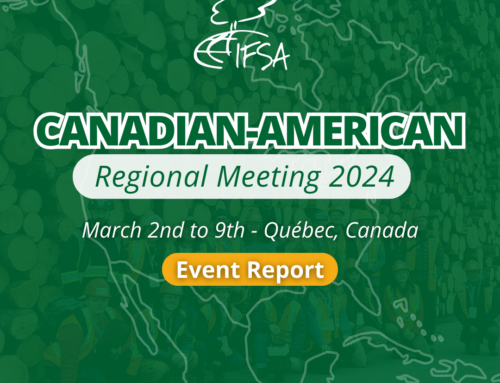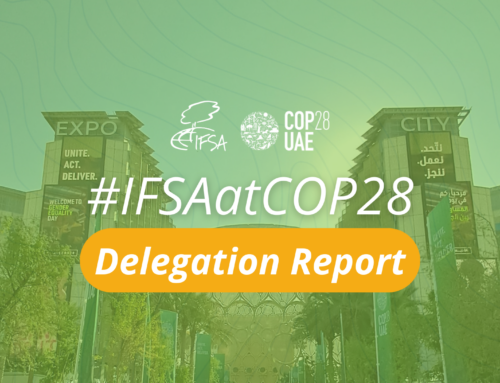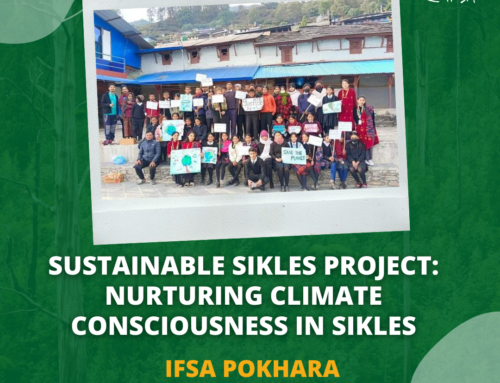UN CONVENTION OF BIOLOGICAL DIVERSITY Breaking news & summaries from the Secretariat World Soil Day – December 5th “Caring for the planet starts from the ground” It can take thousands of years for 1cm of soil to form, and it is estimated that soils host a quarter of the planet’s biodiversity. This makes soil particularly vulnerable for destruction, as it is not easily replaced. Unsustainable agricultural practices, urbanization, pollution, erosion, climate change all contribute to the degradation of soils globally. It is estimated that 33% of lands are degraded, which is why soil protection is a primary goal of many international agreements. Without soils, we would have no farms, crops, food, or forests. Soil is life!
Press Release: States fulfill their commitments to the Nagoya-Kuala Lumpur Supplementary Protocol on Liability and Redress on the Cartagena Protocol on Biosafety December 6th, 2017: the Nagoya-Kuala Lumpur Supplementary Protocol on Liability and Redress will now enter into force on March 5th, 2018. The Protocol aims to contribute to the conservation and sustainable use of biodiversity by providing rules and procedures in the field of liability and redress in respect of living modified organisms. This international treaty requires that response measures are implemented when dealing with living modified organisms to avoid damage and harm. This is a milestone for the Protocol, as it provides international regulatory regimes applying to living modified organisms. This is another step towards realizing the objectives for the Strategic Plan for the Cartagena Protocol on Biosafety, to ensure that biodiversity is used sustainably. The following Parties have now ratified, accepted, approved or acceded to the Nagoya-Kuala Lumpur Supplementary Protocol: Albania, Bulgaria, Burkina Faso, Cambodia, Central African Republic, Congo, Cuba, Czech Republic, Democratic Republic of the Congo, Denmark, Estonia, European Union, Finland, Germany, Guinea-Bissau, Hungary, India, Ireland, Japan, Latvia, Liberia, Lithuania, Luxembourg, Mali, Mexico, Mongolia, Netherlands, Norway, Romania, Slovakia, Slovenia, Spain, Swaziland, Sweden, Switzerland, Syrian Arab Republic, Togo, Uganda, United Arab Emirates, United Kingdom of Great Britain and Northern Ireland, and Viet Nam. More information available at: http://bch.cbd.int/protocol/supplementary
International Mountain Day – December 11th Mountains cover approximately 22% of the Earth’s surface. There are myriad ecosystem functions that mountains facilitate, water supply being the foremost of importance. About 40% of the global population indirectly depends on mountain resources for agriculture, hydroelectricity, biodiversity, and water. Mountains appear to be fixed features on the landscape, but these ecosystems are as vulnerable as the people who live amongst them. Many traditional management practices and cultures are maintained in mountain ecosystems, and nearly 1 billion people call mountains home. Changing weather patterns, increased storms, and droughts have impacted mountain landscapes and created food shortages for 1 out of 3 mountain people in developing countries. In rural mountain areas, food insecurity is 1 out of every 2 people. Maintaining biodiversity promotes resilience on the landscape, which can be done through international agreements and sustainable management practices. Restoration projects, agroforestry, and use of traditional knowledge can assist in the adaptation to a changing climate. The Programme of Work on Mountain Biodiversity aims to implement a strategic plan in order to maintain mountain ecosystems for future generations.
Press Release: UN CBD SBSTTA-21 meets to lay foundation for post-2020 global biodiversity targets 600+ delegates from around the world comprise of a scientific body to meet in Montreal from December 11th to 14th to provide input to the development of a global biodiversity framework after 2020. This is the 21st meeting of the Subsidiary Body on Scientific, Technical and Technological Advice (SBSTTA-21). The biodiversity related issues discussed will contribute to the 2030 Agenda for Sustainable Development and addressing climate change, with implications and actions to reach the 2050 global biodiversity goals. Biodiversity will be discussed in the context of energy, mining, infrastructure, manufacturing and processing industries as we move towards the vision of “living in harmony with nature”. How biodiversity is related to human health and sustainable wildlife management will also be discussed. A plan for the 5th edition of the Global Biodiversity Outlook, a framework for assessment tool for implementation of the Strategic Plan for Biodiversity, will be developed. Finally, tools to evaluate the effectiveness of policy for the implementation f the Strategic Plan for Biodiversity will be reviewed at the 21st meeting of the SBSTTA.
Press Release: UN CBD SBSTTA-22 in July, 2018 The twenty-second meeting of the Subsidiary Body on Scientific, Technical and Technological Advice (SBSTTA 22) will be taking place from July 2nd to 7th, 2018. The second meeting of the Subsidiary Body on Implementation (SBI 2) will be taking place from July 9th to 13th 2018, in Montreal, Canada. More information regarding these meetings at the following webpages: https://www.cbd.int/meetings/SBSTTA-22 and https://www.cbd.int/meetings/SBI-02 . In preparation for SBSTTA 22 and SBI 2 a webpage has also been created to facilitate the peer review of documents for these meetings, which is accessible at: https://www.cbd.int/sbstta22-sbi2/review.shtml. The webpage contains draft documentation, review templates as well as additional information related to the two meetings and will be updated periodically as new documents become available. Currently, there are four documents available for review, including a draft document on the preparatory process for the follow-up to the Strategic Plan for Biodiversity 2011-2020 and a draft document reviewing experiences in holding concurrent meetings of the Conference of the Parties of the Convention and the meetings of the Parties to the Protocols. The latter document has two supporting draft information documents. To provide comments on these documents, please use the template accessible at the webpage noted above and return it to the Secretariat by email at secretariat@cbd.int or by fax at: +1 514 288 6588. The deadline for peer review comments is January 8th 2018.
Press Release: The 10th Meeting of the Ad Hoc Open-ended Working Group on Article 8(j) and Related Provisions From December 13th to 16th, 500+ delegates from around the world will meet in Montreal to discuss Indigenous and local communities’ contributions to the Convention of Biological Diversity. Article 8(j) pertains to Traditional Knowledge, Innovations and Practices. The Rutzolijirisaxik Voluntary Guidelines for the Repatriation of Traditional Knowledge draft will be considered by delegates to provide access to traditional knowledge and information to the original holders. Contributions for traditional knowledge, innovations, and practices of Indigenous peoples and local communities will be implemented into the 2030 Agenda for Sustainable Development, and the glossary for key terms and concepts will be discussed. Finally, the safeguards in biodiversity financing mechanisms pertains to parties, governments, international businesses in the context of biodiversity and the rights and livelihoods of Indigenous peoples. Stay tuned for a blog post recapping this meeting from our own IFSA members, Liz Wass and Catherine Ruest!
UN CBD & WWF Partnership: Connect to Earth The Secretariats of the Convention on Biodiversity (CBD) and World Wildlife Fund International (WWF) partnered to raise awareness of biodiversity and its values. A Memorandum of Understanding (MoU) on cooperation to achieve Aichi Biodiversity Target 1 supports the implementation of the Framework for a Communication Strategy, adopted at COP 13 in Cancun, and solidifies our collaboration towards a common vision that by “2020, at the latest, people are aware of the values of biodiversity and the steps they can take to conserve and use it sustainably”.
Earth Hour 2018, celebrated on Saturday, 24 March, 8.30 p.m. local time, is the world’s largest grassroots environmental event, with activities taking place around the world annually. A bold and innovative campaign on biodiversity awareness developed through this collaboration between WWF and the CBD Secretariats will use Earth Hour 2018 to launch a 3-year campaign leading into 2020. This campaign aims to scale up biodiversity communication to mobilize the world in support of biodiversity protection under the rallying cry of “Connect to Earth” (’#Connect2Earth’).
Promotional materials have been prepared by WWF and will be produced in 2018. They are all “open source” and may be branded according to each organization’s needs. These materials and a tool kit are available at the following link (http://pand.as/partners ).
The promotional materials have been made possible thanks to the generous support of the German Federal Ministry for the Environment, Nature Conservation, Building and Nuclear Safety with funding from the International Climate Initiative.
National governments and local organizations are invited to provide additional translations into local languages of these materials. We would also request you to send your materials adaptation to ehnetwork@earthhour.org.
]]>



